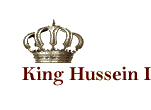 |
 |
The United States In the peace process, the partner doesn't just sit and allow things to deteriorate to the point of disaster. The United States is needed with thoughts and with ideas, not only with the attitude of a messenger between parties, but—when things get rough—to come in and help with what is just and what is right, to overcome difficulty. Interview with Middle East
Insight magazine
In our dialogue with the United States, there are times when we agree and others when we do not. But we always say that, if we are to be friends, we must accept this principle, and others must understand it, that we have an opinion of our own. We have our say. We have a position of our own regarding our interests and the interests of the region, the Arab world, and the world at large. Our dialogue continues and its results, so far, have been encouraging to a large extent. Interview with Orbit Television
The United States, with its tremendous influence and impact on this area and all the people of the region, and its position in the world, should move from being a messenger to being actively involved. It just cannot carry on continuing to deliver messages from one side to another. Interview in the Washington Post
newspaper
There are those who speak about the role of others in this world, and we welcome the efforts of all, be it Russia, the co-sponsor of the Madrid conference, or be it Europe, but we hope that their efforts would be complementary to that of the United States and we will see all working in harmony to achieve progress and to turn the tide (in the peace process). I do not believe that anyone questions the position of the United States. It is always ready to contribute positively to the solution of the problems of this region in terms of its role in the world, and in terms of confidence it enjoys from all sides and I would hope that we and other nations of the world interested in peace will play a supportive role to move ahead. Interview with CNN World Report News
Conference
I value the long friendship between Jordan and the United States, inherited from the era of my grandfather. I have sought over 34 years, since the presidency of Dwight Eisenhower, to ensure that it be honest and true. It has been a friendship built on mutual respect and common interests. I am proud to remind you how we stood shoulder to shoulder during the long years of the cold war. And now together we share a great hope: to establish a lasting peace in the Middle East. We believe that an enduring partnership for cooperation and development between Jordan and the United States is essential to the realization of this dream. Address To The Joint Session Of The U.S.
Congress
Sometimes over these years, I must confess, I have been mystified by what seem to an untrained foreign eye to be sudden and unexplained shifts of policy, and even actions that seem to go against your own declared policies. But over these three decades there has been one central constant factor in our relations: that is, the unbroken confidence and friendship we feel for the United States, despite what I must admit have been certain disappointments in your policies in the past. Our confidence is built on the principles the United States has stood for in the world, and even more on those instances in which you acted forthrightly to put them into practice. We recall the period of World War I when my great-grandfather was leading the Arab struggle for freedom and independence from the Ottoman Empire. It was President Wilson, alone among the leaders of the great powers, who stood up for the right of peoples to self-determination as more than a phrase or ideal. It was, he said, “an imperative principle of action, which statesmen will henceforth ignore at their peril.” It was twenty-five years ago that I made the decision to lead Jordan into the closest possible friendship with the United States. I was twenty years old at the time and President Eisenhower became a source of sound advice and inspiration to me. I took encouragement from the fact that he expressed and also practiced high ideals. I recall especially his forthright stand against the acquisition of terriroty by force in the wake of the second Arab-Israeli war in 1956. Address to the World Affairs Council
As for the United States, your contribution to Middle East peace is critical. Frankly, peace is not possible without your intervention. Your involvement and your role in relation to Israel, and as leader of the free world, is unique—you hold the key. Despite the political challenge and moral confusion which confront you and the world, we hope you will not abdicate your responsibilities of leadership. . . . To accomplish this, you must speak to friends, as well as foes, with a single national voice. The opportunity and responsibility for finally resolving the Middle East conflict resides with you. Address at the First National Bank of
Chicago |